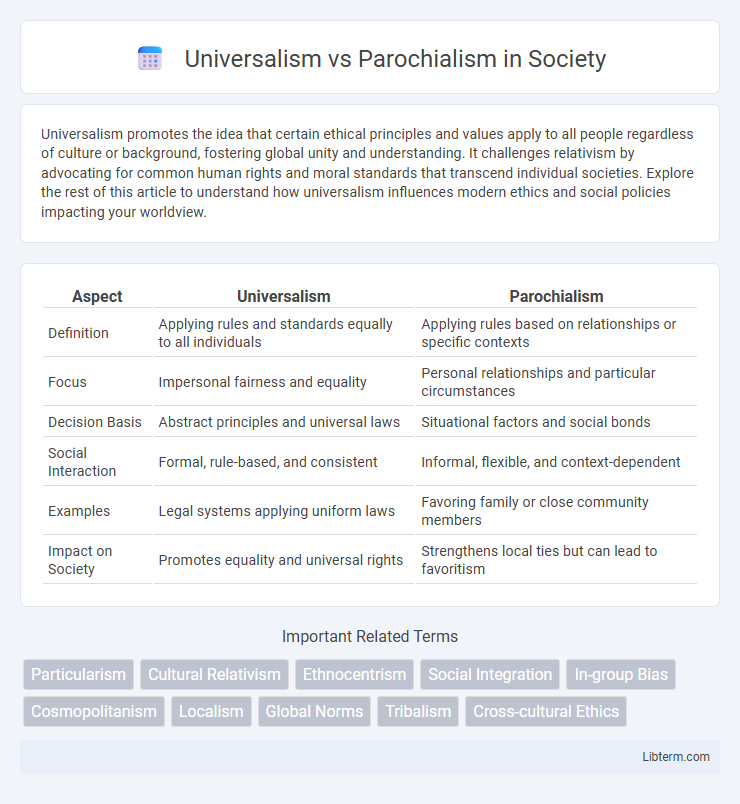Universalism promotes the idea that certain ethical principles and values apply to all people regardless of culture or background, fostering global unity and understanding. It challenges relativism by advocating for common human rights and moral standards that transcend individual societies. Explore the rest of this article to understand how universalism influences modern ethics and social policies impacting your worldview.
Table of Comparison
| Aspect | Universalism | Parochialism |
|---|---|---|
| Definition | Applying rules and standards equally to all individuals | Applying rules based on relationships or specific contexts |
| Focus | Impersonal fairness and equality | Personal relationships and particular circumstances |
| Decision Basis | Abstract principles and universal laws | Situational factors and social bonds |
| Social Interaction | Formal, rule-based, and consistent | Informal, flexible, and context-dependent |
| Examples | Legal systems applying uniform laws | Favoring family or close community members |
| Impact on Society | Promotes equality and universal rights | Strengthens local ties but can lead to favoritism |
Introduction to Universalism and Parochialism
Universalism emphasizes applying consistent rules and standards across all situations, promoting fairness and equality regardless of context or personal relationships. Parochialism prioritizes local customs, relationships, and particular contexts, leading to variable rule application based on specific social or cultural settings. Understanding these concepts is essential for navigating cross-cultural interactions and organizational behavior in diverse environments.
Defining Universalism: Core Concepts
Universalism emphasizes the application of consistent moral principles and rules across all cultures and societies, advocating for universal human rights and ethical standards. It asserts that certain values, such as justice and fairness, are globally applicable regardless of local customs or traditions. Core concepts include impartiality, equality, and the belief that universal norms guide behavior and social judgments.
Understanding Parochialism: Key Principles
Parochialism emphasizes loyalty to local customs, traditions, and immediate social groups, often prioritizing these over broader, universal principles. It fosters strong in-group identity and cultural preservation by valuing particularism and context-specific behaviors. Understanding parochialism involves recognizing its role in shaping social cohesion and resistance to external influences.
Historical Contexts of Universalism and Parochialism
Historical contexts of universalism are rooted in Enlightenment ideals promoting global human rights, legal equality, and ethical standards transcending cultural boundaries, exemplified by documents such as the Universal Declaration of Human Rights. Parochialism, historically prevalent in tribal societies and feudal systems, emphasizes local customs, traditions, and community-specific loyalty shaping social norms and governance. These contrasting frameworks reflect broader socio-political evolutions from localized authority structures toward increasingly global interconnectedness and normative universality.
Cultural Impacts of Universalist and Parochial Attitudes
Universalism promotes standardized rules and equal treatment across cultures, fostering global cooperation and reducing cultural conflicts. Parochialism emphasizes loyalty to local customs and traditions, strengthening cultural identity but potentially limiting cross-cultural understanding. These attitudes shape international business, diplomacy, and social interactions by influencing how diverse cultural norms are respected or prioritized.
Universalism vs Parochialism in Global Governance
Universalism in global governance promotes standardized norms and principles applied universally, fostering cooperation across diverse cultures and legal systems to address transnational challenges. Parochialism emphasizes localized customs and governance tailored to specific cultural, political, or social contexts, often resisting external influences or universal standards. The tension between universalism and parochialism shapes international institutions, affecting policy harmonization, sovereignty debates, and the implementation of global regulations.
Economic Perspectives: Market Implications
Universalism promotes standardized economic policies and regulations, fostering global trade and investment by reducing barriers and enhancing market efficiency. Parochialism emphasizes localized economic practices and protectionism, often leading to fragmented markets and reduced foreign direct investment. Market implications include shifts in competitive advantages, supply chain integration, and regulatory compliance costs across international borders.
Social Cohesion and Identity Formation
Universalism promotes social cohesion by emphasizing shared values and equal treatment across diverse groups, fostering inclusive identity formation that transcends local or cultural boundaries. Parochialism reinforces identity formation rooted in specific cultural, ethnic, or community norms, strengthening internal social bonds but potentially limiting broader social integration. Balancing universalistic principles with parochial ties is crucial for maintaining cohesive societies that respect both collective identity and individual diversity.
Challenges and Criticisms of Each Approach
Universalism faces criticism for imposing rigid norms that may overlook cultural diversity and local contexts, leading to potential ethnocentrism and resistance from communities valuing particularistic traditions. Parochialism encounters challenges due to its emphasis on local customs, which can hinder universal rights enforcement and foster fragmentation in global cooperation. Both approaches must navigate the tension between respecting cultural specificity and upholding consistent ethical standards across different societies.
Striking a Balance: Toward Inclusive Communities
Striking a balance between Universalism and Parochialism involves recognizing universal human rights while respecting local traditions and cultural identities, fostering inclusive communities where diversity thrives. Emphasizing shared values such as equality and justice alongside particularistic customs encourages social cohesion and mutual understanding. Policies promoting intercultural dialogue and inclusive participation ensure that both global principles and local contexts shape harmonious and resilient societies.
Universalism Infographic

 libterm.com
libterm.com